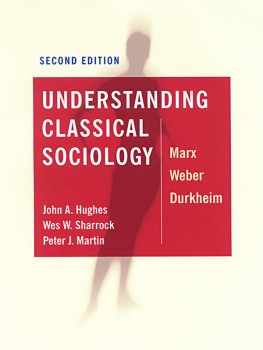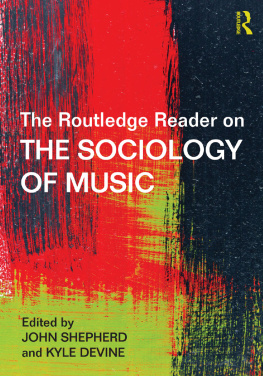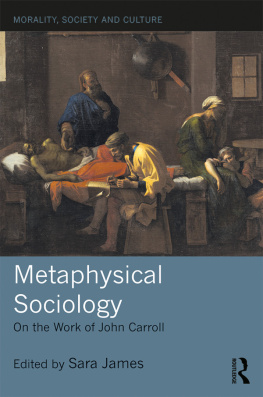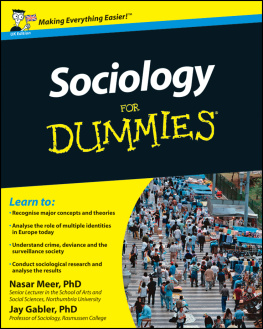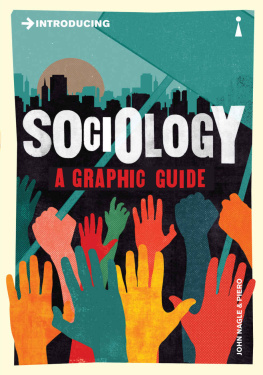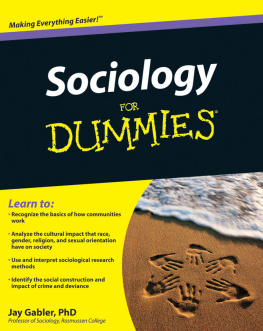John J. Macionis - Sociology
Here you can read online John J. Macionis - Sociology full text of the book (entire story) in english for free. Download pdf and epub, get meaning, cover and reviews about this ebook. year: 2017, publisher: Pearson Education Canada, genre: Science. Description of the work, (preface) as well as reviews are available. Best literature library LitArk.com created for fans of good reading and offers a wide selection of genres:
Romance novel
Science fiction
Adventure
Detective
Science
History
Home and family
Prose
Art
Politics
Computer
Non-fiction
Religion
Business
Children
Humor
Choose a favorite category and find really read worthwhile books. Enjoy immersion in the world of imagination, feel the emotions of the characters or learn something new for yourself, make an fascinating discovery.
- Book:Sociology
- Author:
- Publisher:Pearson Education Canada
- Genre:
- Year:2017
- Rating:5 / 5
- Favourites:Add to favourites
- Your mark:
- 100
- 1
- 2
- 3
- 4
- 5
Sociology: summary, description and annotation
We offer to read an annotation, description, summary or preface (depends on what the author of the book "Sociology" wrote himself). If you haven't found the necessary information about the book — write in the comments, we will try to find it.
Sociology — read online for free the complete book (whole text) full work
Below is the text of the book, divided by pages. System saving the place of the last page read, allows you to conveniently read the book "Sociology" online for free, without having to search again every time where you left off. Put a bookmark, and you can go to the page where you finished reading at any time.
Font size:
Interval:
Bookmark:
Pearson Canada Inc., 26 Prince Andrew Place, Don Mills, Ontario M3C 2T8. Copyright 2018, 2014, 2011, 2008, 2005, 2002, 1999, 1997, 1995 Pearson Canada Inc.
All rights reserved. This digital publication is protected by copyright, and permission should be obtained from the publisher prior to any prohibited reproduction, storage in a retrieval system, or transmission in any form or by any means, electronic, mechanical, photocopying, recording, or otherwise. For information regarding permissions, request forms, and the appropriate contacts, please contact Pearson Canadas Rights and Permissions Department by visiting www.pearsoncanada.ca/contact-information/permissions-requests. Authorized adaptation from Macionis Sociology 15e 2014, and 16e 2016, Pearson Education, Inc. Used by permission. All rights reserved. This edition is authorized for sale only in Canada. Attributions of third-party content appear on the appropriate page within the text. Statistics Canada data used in this publication has either been a) reproduced and distributed on an as is basis with the permission of Statistics Canada; or b) adapted from Statistics Canada. This does not constitute an endorsement by Statistics Canada of the product. PEARSON, and ALWAYS LEARNING are exclusive trademarks owned by Pearson Education, Inc. or its affiliates in the U.S. and/or other countries. Unless otherwise indicated herein, any third party trademarks that may appear in this work are the property of their respective owners, and any references to third party trademarks, logos, or other trade dress are for demonstrative or descriptive purposes only. Such references are not intended to imply any sponsorship, endorsement, authorization, or promotion of Pearson Canada products by the owners of such marks, or any relationship between the owner and Pearson Canada or its affiliates, authors, licensees, or distributors. ISBN: 978-0-13-430804-3

This book is offered to teachers of sociology in the hope that it will help our students understand their place in today's society and in tomorrow's world.
John J. Macionis & Linda M. Gerber
Thinking Globally
Thinking about Diversity: Race, Class, and Gender
Controversy and Debate
Sociology and the Media
Sociology in Focus
Thinking Critically
Thinking Globally
Sociology in Focus Videos
Global Maps: Window on the World
Canada Maps: Seeing Ourselves
The world today challenges us as never before. The economy is uncertain, not only here at home but around the world. Technological disasters of our own making threaten the natural environment. There is much anger about howand whetherour leaders are doing their jobs. Perhaps no one should be surprised to read polls that tell us most people are anxious about their economic future, unhappy with government, and worried about the state of the planet. Many of us simply feel overwhelmed, as if we are up against forces we can barely grasp.
That's where sociology comes in. For more than 150 years, sociologists have been working to better understand how society operates. Sociologists may not have all the answers, but we have learned quite a lot. A beginning course in sociology is your introduction to the fascinating and very useful study of the world around you. After all, we all have a stake in understanding our world and, as best we can, improving it.
Sociology, Ninth Canadian Edition, provides a comprehensive view of how the world works. You will find this book informative and even entertaining. Before you have even finished the first chapter, you will discover that sociology is not only usefulit's also fun. Sociology is a field of study that can change the way you see the world and open the door to many new opportunities. What could be more exciting than that?
Sociology, Ninth Canadian Edition, places a thorough revision of the discipline's leading textbook at the centre of an interactive learning program. Our outstanding learning program has been constructed with care and directed toward both high-quality content and easy and effective operation. Each major section of every chapter has a purpose, which is stated simply in the form of a Learning Objective. All the learning objectives are listed on the first page of each chapter; they guide students through their reading of the chapter, and they appear again as the organizing structure of the Making the Grade summary at the chapter's end. These learning objectives also involve a range of cognitive abilities.
Some sections of the text focus on more basic cognitive skillssuch as remembering the definitions of key concepts and understanding ideas to the point of being able to explain them in one's own wordswhile others ask students to compare and contrast theories and apply them to specific topics. In addition, questions throughout the text provide students with opportunities to engage in discovery, analysis, and evaluation. The Sociology in Focus blog, to which readers can link to at the end of each chapter, gives readers the chance to evaluate many of the most current debates and controversies as they read frequent postings by a team of young and engaging sociologists.
We also strive to get students writing. First, students will consistently encounter Journal Prompts throughout each chapter, where they're encouraged to write a response to a short-answer question applying what they've just learned. A Shared Writing question at the end of each chapter asks students to respond to a question and see responses from their peers on the same question. These discussionswhich include moderation tools and must first be enabled by the instructoroffer students an opportunity to interact with each other in the context of their reading. Finally, at the end of each chapter there is a more comprehensive Seeing Sociology in Your Everyday Life interactive essay.
Finally, another key part of the REVEL content is our video programthe Core Concept Video Series. This is a series of short videos that fall into six categories.
In The Big Picture videos, sociologist Jodie Lawston provides an introductory overview of the text chapter.
The Basics videos present a review of the most important concepts for each core topic in the course, using an animated whiteboard format.
Sociology on the Job videos, created by Professor Tracy Xavia Karner, connect the content of each chapter to the world of work and careers.
Sociology in Focus videos feature a sociological perspective on today's popular culture.
Social Inequalities videos, featuring Lester Andrist, introduce notable sociologists who highlight their own research emphasizing the importance of inequality based on race, class, and gender.
Thinking Like a Sociologist videos introduce students to examples and issues using data. These friendly videos help build students' quantitative analysis skills.
Videos from this series are placed within the narrative where they are most relevant, ensuring that students encounter the videos at the most appropriate moment in their reading.
REVEL will lift students to a higher level of learning. Our students have grown up in a digital world of on-screen action; now, learning about our society will provide this same dynamic experience. The advantages of REVEL over using a traditional print book are many:
Next pageFont size:
Interval:
Bookmark:
Similar books «Sociology»
Look at similar books to Sociology. We have selected literature similar in name and meaning in the hope of providing readers with more options to find new, interesting, not yet read works.
Discussion, reviews of the book Sociology and just readers' own opinions. Leave your comments, write what you think about the work, its meaning or the main characters. Specify what exactly you liked and what you didn't like, and why you think so.



